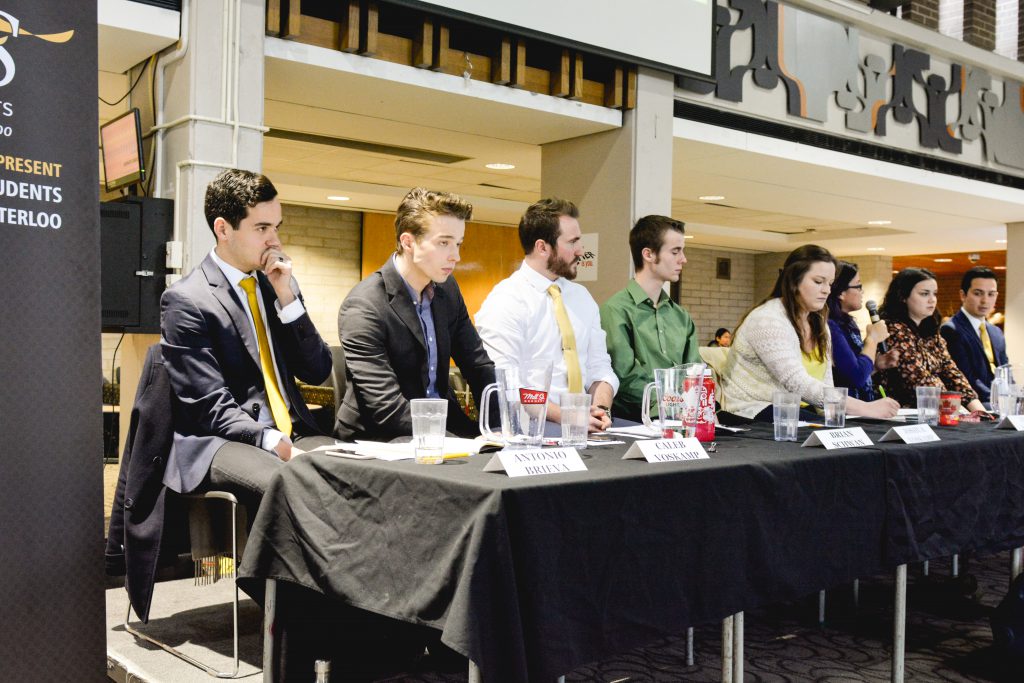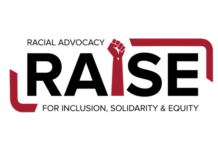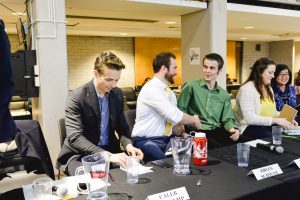
Feds and Imprint co-hosted the 2017 official executive candidates’ debate Feb. 7.
Eight of the ten candidates running for various positions were present. The attendance included presidential candidates Antonia Brieva of Team Gold and Caleb Voskamp of Team Reboot. VP of Operations and Finance candidates included Brian Schwan, with Team Gold and is seeking re-election, and Joshua Voskamp of Team Reboot. VP Internal candidates present were Jill Knight of Team Gold, and Jazbel Wang, running as an independent. Finally, VP Education candidates include Andrew Clubine of Team Gold, and Heather Bone of Team Reboot.
The debate consisted of five rounds. It started with two-minute opening statement from the candidates.
Brieva spoke first and said, “Now I’m not only excited at the prospect of serving you… [I’m also excited about] furthering Feds as an organization that works for you, represents you, maximizes the value of your student dollar, advocates for you, and supports you.”
“Feds wasn’t necessarily representing all students … Feds wasn’t as transparent as they could be [and it was] unclear where they’re going,” said C. Voskamp.
The Voskamp brothers both asserted spending by Feds has double in the last five years. This information seems accurate, as spending three years ago was 2.5 million dollars.
“I just want to make sure we are not just talking about it. I want to make sure [we are] taking concrete actions, and I think that is what my platform offers,” Brieva rebutted.
“I have a love for student affairs, which is why I would love to be your VP Internal … [I am] encouraged to continue working with our colleges, get their opinion and continue working with them, along with our satellite campus,” Knight said.
Jazbel expressed, “I would like to create a more welcoming and inclusive atmosphere … for any space.”
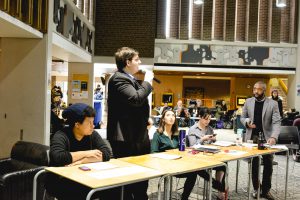 The moderator questioned Josh’s commitment on cutting the Feds fee by $12.50 per year, to which he explained that what he “would be looking to is reduce budget in marketing, IT, and services [salaries].”
The moderator questioned Josh’s commitment on cutting the Feds fee by $12.50 per year, to which he explained that what he “would be looking to is reduce budget in marketing, IT, and services [salaries].”
“The services that are quite visible … are not the main cost areas; what we would be looking to [do] is reduce budget in marketing, IT, and services [salaries],” explained Josh.
“I’m curious to know where in IT and marketing you’re going to cut from without affecting students and support to clubs societies and services,” Schwan rebutted.
Knight discussed how “meeting with CECA, making sure our values are [made clear and our] students focus [come] first, [we want to] make sure we are on the same page” will result in a socially connected CECA.
“[I also want to ensure that] between the students, CECA, and Feds, [everyone’s] thoughts are aligned,” Knight added.
Bone was asked how she plans to advocate effectively for students with reduced resources, as promised by her team’s campaign.
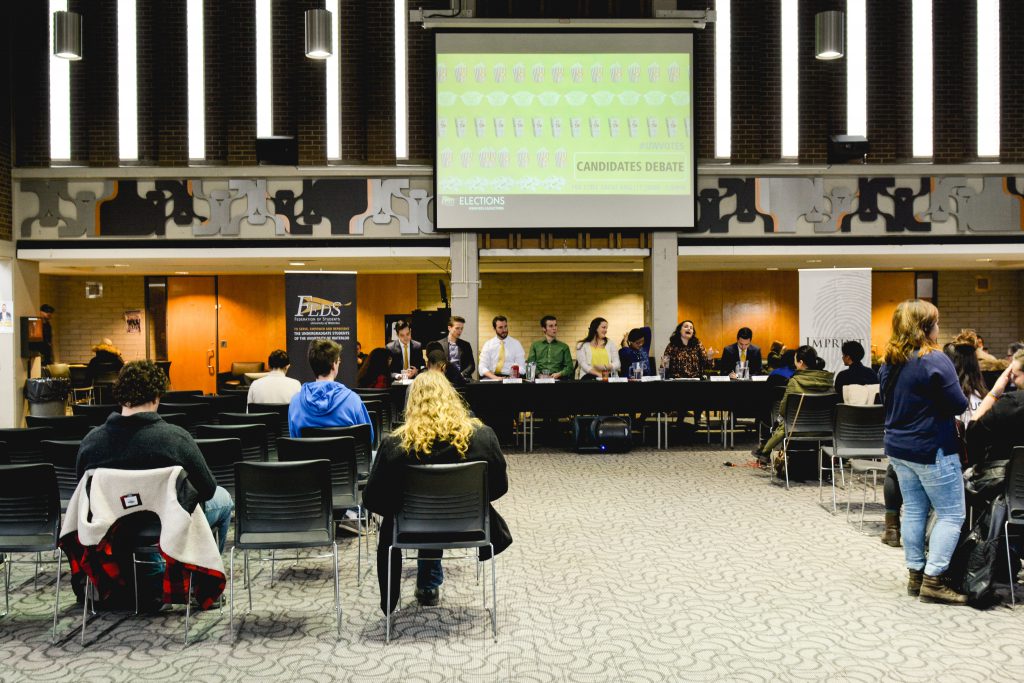 “Trying to find efficiencies is a good … I like the idea of using work studies … Feds pays a lot less money for those students … [I want to combine event planner and work study] into one work study position,” Bone answered.
“Trying to find efficiencies is a good … I like the idea of using work studies … Feds pays a lot less money for those students … [I want to combine event planner and work study] into one work study position,” Bone answered.
Clubine rebutted by stating, “Cuts to the advocacy portfolio [are] unwise … portfolio will be done. It’s not an issue for any of us to address.”
Clubine made it clear one of his priorities will be to advocate for deferred maintenance costs by lobbying to the federal government. He claimed this could be done “by teaming up with other schools.”
Brieva was asked how to “dismantle core barriers to equity” on the campus environment, to which he responded by stating the importance of performing audits in order to identify the correct measures to take.
Caleb discussed “predatory” third-party groups by saying, “One fee we all pay is the Imprint fee… Imprint provides a great service, but they massively overprint. You can see stacks and stacks never opened and never read and we need to re-examine, are we printing sufficient levels, and how to make it cost effective.”
“Imprint is an independent organization outside Feds … whose essential role is to keep the admin and Feds, the student government, to account … I’m not sure if it’s something to re-examine the fee. I don’t agree with that,” Brieva rebutted.
“Feds is a service to provide alternate to students and provide a service … the deficits we keep speaking to are primarily on paper and not year after year,” Schwan rebutted, in response to improving Feds services.
Joshua questioned the merits of a deficit budget.
“I agree Feds services should be run as break-even. I still don’t understand how deficit on paper does not translate to loss somewhere,” he said.
When Clubine was questioned about his priorities in accomplishing difficult goals, he made it clear he would not waste time.
“I’m not going to smack my head against the wall, and waste my time, and your money on something that won’t happen,” Clubine said.
When asked about why CRT should be 24 hours, Jazbel explained, “Health Services is not open 24 hours [and there can be a delay in the EMS; whereas] the CRT is just on the third floor.”
Caleb ended saying, “I came to Waterloo because it was practical … [But] the feedback from students was screw Feds … I want to make sure students are engaged.”
“Team Gold is the most qualified team in this campaign. We believe in the positive impact for you but enhancing the positive impact,” exclaimed Brieva, with the last closing statement of the 2017 Feds-Imprint election debate.
























